If you’re going to go sidemount…
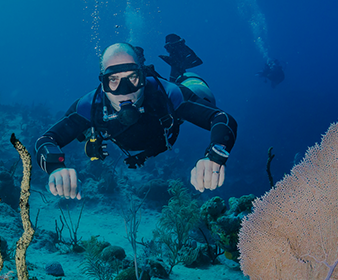
YOU’RE BETTER OFF LEARNING FROM THE FOLKS WHO WROTE THE BOOK Trying new things is awesome. Learning new things that expand your horizons and add to your diving knowledge and fun, well that’s a bonus. And, what’s wonderful about diving is the adventure always has something new to offer! For example, have you tried diving sidemount? RAID offers comprehensive training in sidemount… and this simple recreational specialty could add a totally new perspective to your diving… check it out>>> You probably know that originally, moving scuba tanks from a diver’s back to their sides was a cave diver’s trick making it easier for them to wiggle their way through tight, low passages. And it stayed that way until recreational divers — people doing everyday dives in open water — discovered the advantages that sidemount diving offers. Today, some divers opt to learn sidemount diving almost as soon as they earn their OW20 cert. Enhanced flexibility and trim underwater, plus the added safety of carrying extra gas and a backup delivery system (two tanks), and the fun of learning new and exciting skills, appeals to them. Advantages of sidemount diving include: Drawbacks of sidemount diving may include: Are you wondering how to reap the benefits and avoid the pitfalls? That’s simple. Make sure you receive proper training from a certified instructor to ensure your safety and enjoyment. And the most straightforward way to get that started is to connect with your local RAID dive centre. Do you have any specific questions about sidemount diving?
Getting to know what makes RAID tick…

YOU SHOULD KNOW THIS ABOUT US AT THE VERY LEAST If you’ve ever wondered if it’s it just Corporate EGO that makes RAID tell people we’re bringing positive change to the dive industry? Or if The RAID Way™ is just a catchy slogan and nothing more, RAID’s owners… divers just like you… would like you to understand what being a leader with impact and influence means to us. Then, you can decide if we’re a good fit for you. READ OUT MORE ABOUT RAID>>> CONTACT DIVE RAID INTERNATIONAL HQ>>>
Silent Diving… It Puts A Different Perspective On Things
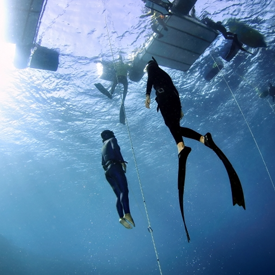
THE BENEFITS OF FREEDIVING WITH RAID RAID is putting a lot of effort and a focus on Freediving programs this year. Why is that? We asked our Freediving SME (subject matter expert) to explain why freediving is important to her and why it’s a benefit for anyone who dives as well as anyone specifically interested in moving into that branch of our sport. “As both a scuba and freedive instructor, I’ve taught a lot of people over the years, including teaching qualified scuba divers to freedive. There are some huge benefits to be gained by taking a freediving course. As a scuba diver, you will already have a pretty good handle on your buoyancy, and the feelings associated with being underwater. Learning to freedive can give you a better understanding of breath control, better equalisation skills, improved buoyancy, improved body awareness and more confidence in the water. This can make you into a more relaxed and efficient scuba diver, with better air consumption, meaning you can dive for longer.” Pash Baker is also an underwater photographer, and one of the things she loves about freediving is the ability to have incredible animal encounters that are simply not possible on scuba. “I’ve had baby humpbacks swim over to check me out and then stay and play a while. I’ve freedived with blue whales, had a one-on-one encounter with an Oceanic White Tip shark on breath hold and many other amazing experiences. The images I take while freediving are very emotive for me, as they are attached to memories of phenomenal encounters.” So, with all that in mind, we hope the agency’s recent focus on freediving begins to make sense and that this month… and onwards… you think seriously about expanding your personal experience to include breath-hold, no-tank diving with RAID. And above all the benefits that Pash mentions, it’s fun! VIEW FREEDIVING PROGRAMS HERE>>>
RAID Adds XCCR Training…
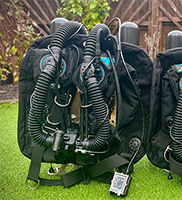
EXPEDITION GRADE CCR FROM iQSub NOW AVAILABLE Dive RAID International is so pleased to tell you that we have added training on the XCCR series of rebreathers to our available courses. This unit represents the state-of-the art in CCR design and configuration and we are happy to offer this option to those of you diving The RAID Way™. The compact and ergonomic design facilitates assembly and maintenance. without special tools and the controlling software has been written to reduce human error and increase usability. When it comes to matching the unit to diver needs, that are two canister models – made of Delrin or marine grade hard anodized Aluminum with teflon coating. The capacity for Diluent and Oxygen tanks range from two to seven litres and the quick-release fasteners make tank replacement fast and secure. XCCR uses a radial scrubber with a manufacturer-guaranteed six-hour duration as standard. both oxygen and diluent manifolds have multiple outlets. So, off-board gases can be connected/disconnected directly via Swagelok QC6 quick connects for those divers who need this added function. This machine is a serious tool for serious divers. The head of the XCCR is designed to have advanced air flow paths to eliminate condensation forming on the O2 cells. The Shearwater SOLO board in the head serves reading from three O2-sensors, solenoid firing, CO2-reading, HP reading on Oxygen and Diluent tanks, Head-Up Display control. If the user cuts any cable, the unit will still carry on working and maintain the PPO2 up to surfacing. The X-CCR unit is equipped with Shearwater DiveCAN Petrel2 Controller on the left hand and with DiveCAN Head-Up Display placed on the BOV. The Shearwater electronics has very low power consumption and provides long term battery life. O2-sensors and built-in CO2 sensor are placed in the easily removable cartridge making it easy to dry, check, or replace the sensors. PPO2 readings are electronically separated and in the event of a short circuit on any sensor or cable or one of the computers, the ppO2 reading on the other computer is not affected. There are two independent replaceable ubiquitous Li-Ion 18650 batteries located in sealed compartments out of the breathing loop, so the breathing gas can not be contaminated in the event of a battery leak. The unit’s wiring design is such that a diver should never have to miss a dive due to battery problems. Other features– Every unit is tested to 150m before it leaves the factory.– CE approved. RAID is proud to add training on this exceptional CCR to its growing suite of technical diving programs. Contact your local RAID dive centre for details.
What exactly is a dive agency…

AND WHAT DO THEY SELL? You could be a certified diver with a couple of dozen logged dives, or even have years of experience diving tonnes of exotic spots around the globe, but the chances are that if your great aunt Mildred — the nice one from Brighton — asked you to explain what a dive agency is — what it does: and what exactly it sells — you might not be comfortable answering. Well, you might be happy to answer initially but later you’d feel guilty when you realised you’d supplied her a dodgy answer. Don’t fret, there are a few people who actually work full-time in the dive industry who’d have trouble responding intelligently to that one! The most obvious mistake that folks make, including great aunt Mildred and a lot of people like her, is thinking that a dive agency ‘does’ diver training. They do not. When a student signs up to become a diver, the scuba instructor, the man or woman who’s going to teach them, doesn’t work for the agency. Dive agencies do a few things but teaching is not one of them. That’s the job of dive instructors, and they are employed by local dive shops or dive resorts, and not the dive agency. A dive agency is more like a sort of lending library or publishing company. They sell books. Books about diving. Mostly. (We’ll get into the nuances a few paragraphs down.) But essentially, dive agencies pay “subject matter experts” to write books about all things related to diving, and then they charge a fee for people to read them. Some agencies actually sell printed books… really old-school. However, most sell eBooks. So, their library is virtual rather than some sunny alcove in a vast book-lined athenaeum with potted aspidistras, overstuffed leather chairs, and side tables supporting cups of tea and dainty plates of cucumber sandwiches with the crusts cut off. It follows then that dive agencies make their money primarily from selling library access to the dive professionals who actually do the teaching. Occasionally they may sell directly to student divers, but most of the time an agency’s primary customers are dive pros. It’s important to understand these ‘reading’ fees are modest. eBooks are inexpensive, and in fact represent a small fraction of the cost of a diving course. For instance, an agency makes fewer than $30 from a typical open water class regardless of what the student pays to take the class. The agency fees for a more advanced course, let’s say on a rebreather, nets an agency a little more, perhaps $100, but that is still a fraction of the total cost of learning to dive a rebreather. The bulk of the money, and in fairness, the bulk of the work goes to the shop or instructor. For example, an experienced CCR instructor would charge a student more than $1500-plus for a course that would take a week to deliver. Big difference. But it’s not all pennies and pocket lint for an agency. Firstly, there are obvious economies of scale. A dive shop or instructor certifying 200 basic students a year could be doing very well, but one of the so-called Big Seven agencies will issue thousands and thousands of this type of diver certs every year. And there are other “products and services” that an agency sells. Dive agencies, and there are dozens of them around the world, also police the way diver training is delivered. And this, indirectly, is what makes them money. Dive agencies charge its members — instructors and dive centres — money to be part of their business network. This includes marketing and promotion, but the main ‘product’ is the assurance and protection that comes from those ‘policing’ duties. An intangible but a vitally important one. The way each agency administers this responsibility varies a lot from agency to agency. Some are more strict and on the ball than others. But a common thread is they each publish standards — detailed outlines, a framework — that instructors are required to follow when they are teaching students. These standards make it clear, how to teach, what to teach, how to maintain control, and give tips on how to prevent things going pear-shaped. And it’s the agency’s standards that must be met in order for a student diver to be “certified.” You sometimes hear people refer to diver certifications as a dive licence but a diver certification isn’t really a licence. Not in the legal sense of the word. It just tells whomever is interested that the diver has completed such-and-such course and satisfied the course’s published standards. Certifications, certainly those from the major agencies, are recognized by dive operations globally. And a certification card — digital or physical — is required to rent dive gear, buy a gas fill, get onto a dive boat, have access to a dive site. So, dive instructors and dive operators pay fees to an agency to plug into those standards. Most agencies charge dive instructors an annual subscription — usually a few hundred dollars — to be a member. RAID is unique in that it offers its professional members Zero FEe-Membership. As long as they stay active and certify a handful of students each year, membership fees are waived. We still offer full support to our members, and our students, but RAID’s cost of doing business is kept low — our shareholders are divers not venture capitalists — and we serve a growing market. So, what to tell great aunt Mildred? Unless you enjoy watching someone’s eyes glace over, the suggestion is to tell her that dive agencies are in business to keep divers safe, active, and happy. You know a little more than that now, but the best message is that simple one. WHAT MAKES RAID TICK>>> CROSSING OVER TO RAID>>> THIS IS A BUSINESS OF DIVING MESSAGE FROM DIVE RAID INTERNATIONAL… FEEDBACK>>>
WHY RAID
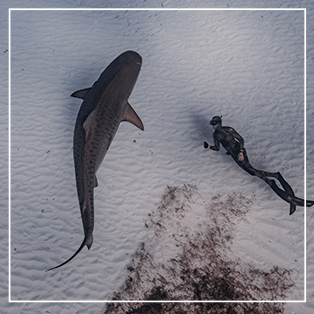
REASON #775 Did you know that RAID offers a complete Freediving program including static apnea?
WHY RAID

REASON #112 Our focus is on developing relaxed, skillful divers… from day one.
Be The Best You Can Be
RAID PERFORMANCE DIVER This excellent RAID program has been a popular choice for divers since it was first introduced. It’s value as a serious refresher program for any level of diver (recreational or technical, open or closed circuit) has always been recognized, but it is particularly popular with experienced divers who have come up through other agencies, and who feel their skills and understanding of advanced dive protocols is a little “rusty” or lacking. We feel the Performance Diver course is unique approach to making better divers. However, that’s a common selling point… making you a better diver is part of the pitch from every dive agency and dive shop. But what exactly does it mean… what’s the real benefit? RAID’s programs focus on teaching real-world diving skills. Skills that make divers feel confident and comfortable in the water. Not only does that result in safer divers, but it’s an easy transition from that to more active divers… people who dive because it’s fun and they like it. The skills taught in this course have been designed by some of the most respected dive professionals in the industry. They have condensed years of in-water experience into a great program that’s fuelled by great ideas and solid knowledge. Something useful in all sorts of conditions and all sorts of gear configurations. In short, a range of skills you will use on every dive: buoyancy, trim, situational awareness, gear selection and management, contingency planning… having fun and staying safe. No matter how well you dive now, Performance Diver will make you even better. The applications of the program are endless. Any dive in any environment or equipment design can be made safer, easier, and more fun by utilizing the skills mastered in this course. SIGN UP TODAY >>> HERE
Crossover Process Streamlined
As an Instructor Trainer or Master Instructor Trainer crossing over instructors for other agencies to RAID, you may have run into a minor issue in the past. This is because Instructor Trainers and Master Instructor Trainers couldn’t directly sign off on the Instructor Open Circuit section unless they also had Examiner’s status. We have fixed this annoying glitch in the system. You will now find that when you’re conducting a crossover course, you now have the ability to designate yourself as the Instructor Trainer when you are using the Crossover Credit. This simple work around allows you to sign off crossover candidates and complete the process without needing an Examiner. However, one point to remember: Master Instructor Trainers are still unable to instruct new specialties. If a candidate lacks qualifications like Openwater, Deep, or Nitrox Instructor certifications from another agency, an Instructor Trainer or Examiner will need to assist in teaching these specific Instructor Programs during the crossover process. And of course, this extra work justifies additional fees. Any questions, please contact your RRO.
Freediving Pool Instructor
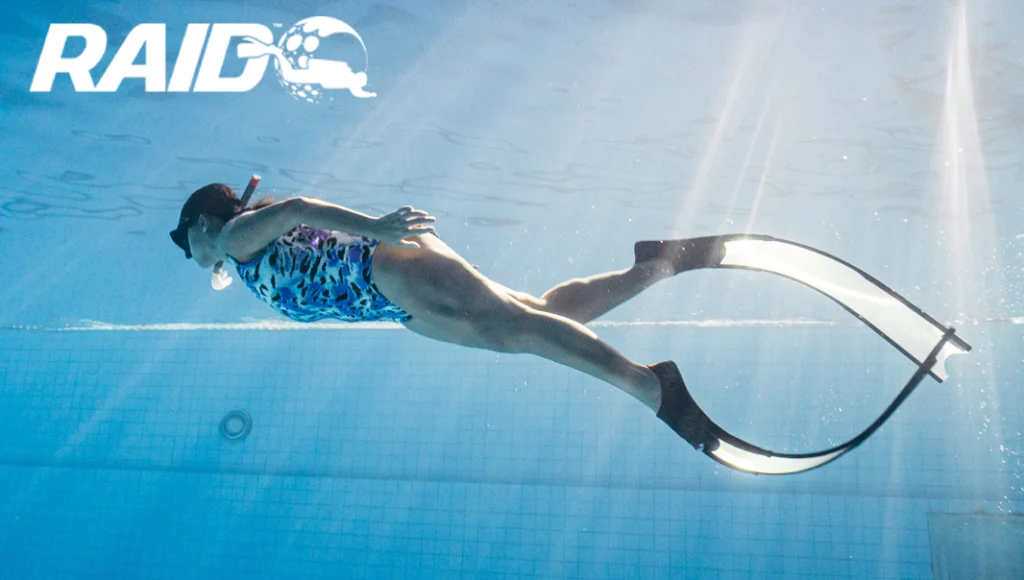
RAID OPENS UP A WHOLE NEW CONCEPT IN FREEDIVING Always the innovator, in the past few months, the team at RAID has been able to launch several new programs and each of them has been exciting to work on and release to you. But this is something we are delighted and extremely eager to tell you about. It tops everything. Freediving Pool Instructor offers ALL RAID Scuba Instructors a convenient pathway to becoming certified pool freediving instructors, and that’s the sort of innovative idea we think the dive industry needs right now. This is a new adventure and it starts right here. The word, unique, gets used a lot whether or not its deserved, but we think this course is truly unique and deserves taking a good look at because it was specifically created to leverage the expertise scuba instructors have developed while teaching scuba students. And because of that, we feel there’s a natural fit for them to introduce their customers (old and new) to the freedom and fun of freediving. And just in case you are wondering what’s so special about freediving and how does ‘one breath’ diving without a tank relate to any other form of diving, here’s a piece of shocking news. The skills taught in a basic freediving class, including but not limited to how the calm one’s mind and control the breathing cycle, we believe are fundamental to diver comfort and safety. There is a groundswell of opinion that learning to freedive is perhaps as important as learning to swim for any one who’s truly interested in becoming a balanced and relaxed diver… on scuba, a rebreather, or anywhere in between. If you agree, or are interested to find out if you agree, and you’re a RAID instructor, we’d like to suggest you get in touch. If you’re a RAID diver, we strongly suggest contacting your RAID instructor or dive centre. Pool Instructors will be qualified to teach in confined water four excellent programs that promise to be best-sellers: Contact your local RAID office for details and standards.

